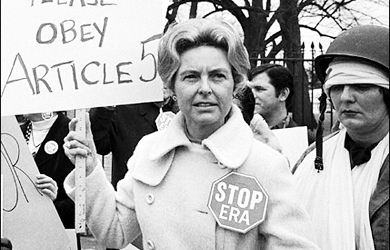In a WorldNetDaily column today, legendary anti-feminist Phyllis Schafly joins the far-right attacks on Cornelia “Nina” Pillard, one of President Obama’s three nominees to fill vacancies on the influential Court of Appeals for the D.C. Circuit.
As Slate’s Dahlia Lithwick has ably explained, the far right’s objection to Pillard is what they see as her excessive support for women’s equality – including “radical” ideas like access to birth control and paid family leave.
So it’s no surprise that Schlafly, who has built a long career out of opposing any and all advances to women’s rights, is now joining the Family Research Council in skewing the record to attack Pillard, whom she calls “a scary feminist” with a trail of “extremist feminist writings”:
Obama not only has the help of the ACLU and similar organizations to pursue anti-religion litigation, but he is determined to appoint many like-minded judges to the federal courts. He recently nominated a scary feminist named Nina Pillard to the important D.C. Circuit Court of Appeals.
Her extremist views include the wild allegation that abortion is necessary to help “free women from historically routine conscription into maternity.” She says that those who oppose Obamacare’s contraception-abortion mandate are really reinforcing “broader patterns of discrimination against women as a class of presumptive breeders.”
Obama would surely like to get supremacist judges to carry out his goals to rewrite the meaning of the First Amendment. We hope there are enough Republicans in the Senate to expose Pillard’s paper trail of extremist feminist writings.
It’s worth mentioning that the woman who Schlafly calls a “scary feminist” has a long history of finding common ground across ideological divides. She worked on the same side as both Bush administrations as a litigator on several major constitutional cases. She also runs Georgetown Law School’s respected Supreme Court Institute, which helps lawyers from around the country in preparing for Supreme Court arguments without regard to which side they represent (including attorneys arguing every single case before the Supreme Court this year). She even led the committee whose research was used by the American Bar Association that found ultra-conservative Justice Samuel Alito “well qualified” for his job.
But Schlafly’s definition of “scary feminist” encompasses just about anyone who supports any sort of legal rights for women. In fact, Schlafly has gone to bat against Pillard before, criticizing two of the nominee’s most widely-hailed victories on behalf of women’s equality: winning the Supreme Court case brought by the George H.W. Bush Administration that opened the Virginia Military Institute to women, and working on the same side as George W. Bush administration lawyers to successfully defend the Family and Medical Leave Act in the courts.
Schlafly, of course, railed against both victories. She charged that the Supreme Court’s decision upholding the FMLA “was based on feminist fantasies about a gender-neutral society” and when the Supreme Court unanimously struck down VMI’s discriminatory admissions procedures, she wrote to the school’s alumni:
The massive government lawsuit against VMI wasn’t about “ending sex discrimination” or “allowing women to have access to the same educational benefits that men have at VMI.” It was a no-holds-barred fight to feminize VMI waged by the radical feminists and their cohorts in the Federal Government.
…
Since feminists successfully got women admitted into the military academies, and got the Clinton Administration to assign women to military combat positions, VMI and the Citadel remained as the most visible fortresses of the concept that men and women are fundamentally different. The feminists hate you just because you exist.
Which is to say that if Republican senators decide to adopt Schlafly’s definition of “scary feminist,” they should know that it includes not only the basic defense of reproductive rights, but also support for laws that allow women to work outside the home while raising children and the belief that public institutions shouldn’t discriminate on the basis of sex.







